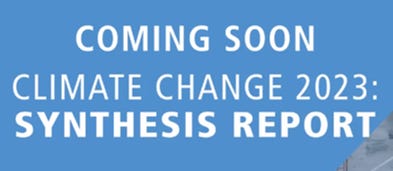A Primer on Implausible Climate Scenarios
What you need to know in advance of the IPCC Synthesis Report
Next Monday the Intergovernmental Panel on Climate Change will release its so-called “Synthesis Report” which will integrate the findings of six different reports that it has released since 2014. I have not participated in the IPCC nor have I seen the new report. However, I have little doubt that one of the main issues that we will be discussing next week when the report is released will be the implausible climate scenarios that underpin much of the work of the IPCC over the past 9 years.
Research I’ve been involved in — along with colleagues Matthew Burgess and Justin Ritchie — shows that the emissions scenarios that have guided the work of the IPCC and the broader climate research community are widely off the mark. In short, they are far too extreme, both in what they project for today and especially into the future. Our work is part of a growing consensus in the literature about the implausibility of extreme climate scenarios — a consensus so strong that it was acknowledged in the most recent IPCC assessment reports, even though it complicated their messages.
The ubiquity of out-of-date scenarios throughout recent IPCC reports and the underlying literature that is has assessed means that the IPCC Synthesis Report, summarizing its work since 2014, runs the risk of promoting out-of-date science. If so, that would be a lot like driving down a highway looking in the rearview mirror. You can certainly do it, but it’s not a great idea.
I have written a lot in recent years about the out-of-date scenarios of the IPCC and I thought it would be useful to prepare this short primer for those wanting to better understand the issues or simply to be reminded of the key findings. At the end I’ll make a couple of key papers available as PDFs for paid subscribers, for those wanting to take a really deep dive. You also find a couple open access papers linked below for all readers.
Comments and questions are welcomed. I’ll follow up next week after the IPCC Synthesis Report is out and appreciate your engagement as we explore this together.
What Did IPCC AR6 Working Group 1 Say About Extreme Scenarios in 2021?
A good place to start is with the most recent IPCC report on the physical science of climate change, with its conclusions heavily dependent on the choice of scenarios to emphasize. The recent IPCC reports revealed a core tension — it acknowledged the low likelihood (its words) of the scenarios that it focuses the most attention on and, by extension, that it ignores scenarios with a much greater likelihood. That’s a recipe for confusion and misleading projections, not to mention doomism and hyperbole.
Why Do Implausible Scenarios Live On, Like Zombies?
This post is from 2020 and is the most-read post ever here at The Honest Broker. In it, I try to explain why it is that out-of-date scenarios, undeniably so, are so difficult to displace in climate research. It is a serious problem that is just as bad in 2023 as it was in 2020. The title of this post is even more appropriate than I could have imagined. The issues here have much more to do with how science operates (and sometimes doesn’t) rather than climate politics, but there is certainly a role for each.
What Does Our Latest Research Show?
Last summer, at the IIASA Scenarios Forum I presented the results of our most recent work (published in ERL and PNAS, both papers are open access, so have a look) on the plausibility of climate scenarios of the IPCC’s Fifth and Sixth assessment reports. There is good news here. And that’s OK to say! However, you’d barely know it from the legacy media (though, to be fair, there has been some progress).
You can watch my full talk at the link below, it is less than 15 minutes.
What Would a Climate Researcher from 2005 Think About Your Research?
I am actually such a time traveler, having worked on the use and misuse of climate projections for almost 3 decades. It just has taken me three decades to get here. Without a doubt, the researchers from that earlier era would be quite happy with what we’ve recently learned. I imagine in the post below what they might say after exiting the time machine.
After the jump, PDFs of two papers of ours that together tell a more complete story of implausible scenarios and how climate research got off track. One is short and digestible, the other is a magnum opus.
Pielke, R., & Ritchie, J. (2021). How climate scenarios lost touch with reality. Issues in Science and Technology, 37(4), 74-83.
Pielke Jr, R., & Ritchie, J. (2021). Distorting the view of our climate future: The misuse and abuse of climate pathways and scenarios. Energy Research & Social Science, 72, 101890.
Finally, I want to again acknowledge the excellent work of my colleagues Matt Burgess and Justin Ritchie. Of course, they are never responsible for my musings here, but without them, my musings here would be much less informed and I’d know a lot less about climate scenarios. I look forward to more collaborations and the opportunity to keep learning from them.
I appreciate your support. I am embarking on an experiment to see if a new type of scholarship is possible. I am looking to make a break from traditional academia and its many pathologies, and this Substack is how I’m trying to make that break. I am well on my way. Please consider a subscription at any level, and sharing is most appreciated. Independent expert voices are going to be a key part of our media ecosystem going forward and I am thrilled to be playing a part. You make that possible.





